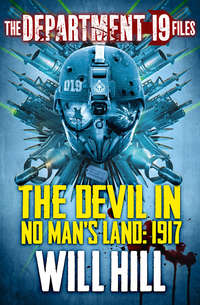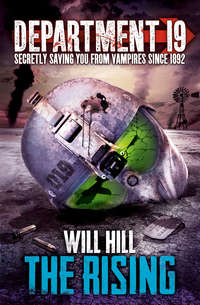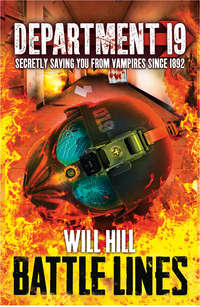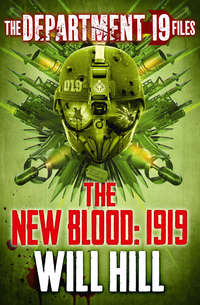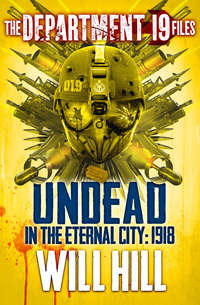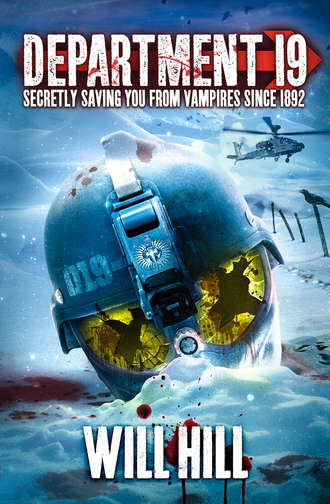
Полная версия
Department 19
Jamie felt the sharp points of her fangs through the plastic sheet, felt her mouth squirming for purchase , and opened his mouth and screamed, until the girl sat up and placed her hands around his throat, cutting off the air supply to his lungs.
I can’t breathe. She’s going to strangle me.
He looked up dimly at the hideous plastic-coated apparition that was killing him. The girl was bleeding again, dark red spots pattering the inside of the sheet, and she was howling and screaming and tightening her grip on his neck with every passing second. He could hear voices yelling from a long way away, and he saw two more figures – he couldn’t make out whether they were soldiers, scientists, or something else – grab the girl and try to pull her off him. Both were sent sprawling by casual flicks of the girl’s left arm, which left his throat for a millisecond before returning to exert its deadly pressure.
“Shoot her,” he heard someone shout in a voice that sounded like it was coming from underwater, and there were a series of loud cracks, like fireworks. The girl bucked and jolted, and blood soaked the inside of the plastic sheet, some of it spraying through the holes the bullets had torn and landing on Jamie’s face in a fine mist. But still she did not release her grip.
Jamie’s head was pounding, his vision darkening, his chest burning. He needed air now, or it would be too late.
As he felt his eyes beginning to close, something huge flew across his narrowing field of vision. There was a loud crunching sound, and suddenly, blissfully, the pressure on his throat was gone. He opened his mouth and took a giant, terrified breath, his chest screaming, his pounding head thrown back as oxygen flooded into his desperate lungs.
There was an incredible commotion in the hangar above and around him, but he barely registered it as he realised with savage, victorious elation that he wasn’t going to die.
Not now, at least.
His vision was clearing, the thumping noise in his head starting to recede, when a dark shadow appeared above him, and knelt down. Jamie looked up at the shape crouching over him; the image came into focus and he stared into the face of Frankenstein.
“Can you sit up?” he asked, his voice surprisingly gentle, and Jamie nodded.
He pushed himself up with his elbows and looked around the vast hangar. Scientists and doctors were clustered around the fallen soldiers, but almost everyone else was staring at him, concern and fear mingled on their faces. A rush of panic shot through him and he looked for the girl that had attacked him.
“Don’t worry about her,” Frankenstein said, as though he could read Jamie’s mind. “They’ve got her.”
He pointed to the left, towards the open doors. Jamie turned his head to look, and smiled weakly at what he saw.
Two soldiers were holding up the girl. The whole left side of her face was swollen, her arms and legs dangling limply above the ground. As Jamie watched, a scientist slid a hypodermic needle into her neck and depressed the plunger, sending a bright blue liquid into her jugular vein. Two doctors picked the stretcher up from the ground, righted it, and wheeled it over to the soldiers, who lowered the girl on to it. The doctors zipped the plastic sheet back into place, as Jamie stared at the figure beneath it. The girl’s chest was slowly rising and falling.
“She’s not dead,” he said, softly. “But they shot her. I saw the bullets hit her.”
“She’s not dead,” confirmed Frankenstein. “She’s something else.”
Chapter 8
THE LYCEUM INCIDENT, PART II
BENEATH THE LYCEUM THEATRE, LONDON 3rd JUNE 1892
The valet descended first, hand over hand down a rope, a lamp hanging from his belt. The hole was pitch black, but the flickering gas light was strong enough to pierce the edges of the darkness, and he touched down gently.
“Twelve feet, no more,” he shouted up to his master. He heard the old man instruct Stoker to find fifteen feet of ladder, smiled, then surveyed the area with his lamp.
He was standing in a round chamber, built of large white stones that had been turned a speckled grey by years of dust and darkness. Four arches were set into the walls of the chamber, the stone crumbling in places but holding steady. The same could not be said for the passages that led away from three of the arches; the roofs had long since given way, collapsing into piles of broken masonry that blocked the way completely. The fourth passage was clear, and its stone floor was scuffed with footprints.
The wooden feet of a ladder thudded to the ground behind him, then Van Helsing and Stoker made their way down one after the other, holding lamps of their own.
“What is this place?” asked Stoker, his eyes widening as they adjusted to the gloom.
“Catacombs, or cellars, or possibly something else entirely,” replied Van Helsing, peering at the stone walls, and the valet felt a shiver dance up his spine. He had never heard his master sound uncertain, not at any point in the two years he had served him.
The old professor approached the arch of the one passable corridor and looked down at the footprints in the dust.
“This way,” he said, as he stepped into the passage.
The space between the stone walls only allowed for single file, so Stoker followed Van Helsing and the valet followed them both, his hand buried in his jacket pocket, gripping something tightly.
Van Helsing led them through the stone corridors, pausing at junctions and tipping small pools of flaming oil on to the dusty floor, markers that would hopefully lead them back to the ladder.
The passages were pitch black, lit only by the flickering orange of the lamps. At the edges of the light, rats scurried into cracks in the ancient stone, their pink tails leaving thin lines in the thick dust. Heavy, intricate webs hung between the walls, ropy strands of silk that caught in the men’s hair and brushed their faces. The dark brown spiders that had woven them squatted in the highest spirals, thick-bodied creatures that Van Helsing didn’t recognise, although he kept this information to himself. The stone floor was uneven, cracked and subsiding, and the going was slow. Twice the valet had to reach out and grab Stoker’s shoulder when a slab moved under his feet, preventing the night manager from turning an ankle, or worse.
This was no place to be carrying an injured man.
It was difficult to gauge the passage of time in the darkness, but after a period that could have been as much as an hour or as little as ten minutes, the glow of light became visible in the distance, beyond the arc of their lamps. The three men headed towards it.
The light grew brighter and brighter, illuminating more details on the stone walls as they approached. At head height, carved into the wide slabs of the narrow passages, were the grotesque faces of gargoyles, their mouths open wide, forked tongues protruding between triangular teeth, their eyes staring out from wrinkled, finely worked skin. Stoker muttered to himself as they passed them, his hip flask now almost permanently attached to his lips. The valet watched with mixed emotions. He did not want to have to rely on a drunken man if, as seemed increasingly likely, they found trouble at the end of this labyrinth. But nor did he have any desire to answer the night manager’s questions, or placate his fears. If the brandy was keeping him quiet and putting one foot in front of the other, the valet supposed that was sufficient.
As they neared the source of the light, it became clear that it was shining through an ornate arch, much larger than the passage they were travelling along. Indeed, as he looked, the valet could see that the walls and ceiling were now tapering gently outwards, widening the corridor in a way that was extremely disorientating. Stoker stumbled, yet again, and the valet gripped the man’s shoulder and righted him. The night manager murmured thanks, and they pressed on, until they walked under the towering arch, and entered hell.
The arch opened into a square cavern, lit on each side by pairs of two flaming torches. The lower walls were covered in carvings: gargoyle faces, humanoid figures and long rows of text, chipped out of the stone in a language the valet had never seen before. On a stone slab in the middle, her arms and legs bound with rope, her skin so pale it was almost translucent, was a girl.
“That’s her,” whispered Stoker. “Jenny Pembry.”
Van Helsing quickly crossed the room and began examining the girl, while Stoker and the valet stood frozen under the arch, taking in the horror that surrounded them.
In the four corners of the room were the missing employees of the Lyceum theatre.
To their left was the trumpet player, the fraying remains of his dinner suit hanging from his decaying corpse, which had been propped against the stone corner. His legs and arms were missing, and the skin that remained on his face was a green so dark it was closer to black. Stoker turned back into the passage and retched, his hands on his knees, while the valet approached the body. As he neared it, he saw pages of sheet music had been crammed into the dead man’s mouth.
In the next corner was the understudy, clad in what remained of her Queen Titania costume. Her tiara, rough metal painted gold, shone horribly above the decomposing flesh of her face. Her legs had also been removed and her ballet shoes placed on the floor before the ragged stumps, a practical joke of vicious cruelty. Her eyes were gone, although the valet could not tell whether this had been deliberate or the inevitable consequence of her final resting place.
In the final two corners were the missing chorus girls, arranged so they faced each other. They were less decayed than the others, and their death agonies were still visible on their faces, their teeth bared, their eyes wide. Both girls were naked, their torsos grotesque patchworks of cuts and stitches, done with what the valet realised to his horror were pieces of horse gut from a violin bow that lay between them. They were horribly, unnaturally pale, their veins invisible.
All four of the bodies, the valet realised, had a pair of ragged puncture wounds on their necks.
“She’s still alive,” said Van Helsing.
At his master’s voice the valet turned away from the horrible fates that had befallen the chorus girls and approached the altar. Stoker followed, unsteady on his feet.
On the slab, Jenny Pembry was barely conscious, moaning and turning gently against the ropes that held her fast. The valet pulled his knife from his belt and sliced through the ropes. Van Helsing gently lifted the girl down and passed her to Stoker, who held her at arm’s length, his face blank with terror.
“Hold her, damn you!” barked Van Helsing. Stoker flinched and drew the chorus girl tight against him.
“She’s been bled almost dry,” Van Helsing told the valet. “Recently, too. The jugular blood is still warm.”
“Where’s the conductor?” asked the valet, his voice low.
“I don’t know,” replied Van Helsing. “If he’s in one of other tunnels we will need more light, and many more men. If he’s—”
A drop of blood landed on the valet’s shoulder.
The valet examined the dark material of his jacket, then slowly both men looked up into the roof of the cavern.
Harold Norris hung upside down from the stone roof of the chamber, twenty feet or more above them, his arms folded across his chest, his eyes closed, like a grotesquely swollen bat. His mouth and chin were dark with Jenny Pembry’s blood and as the three men stared upwards, drops of crimson fell softly on to the dusty floor between them.
“Be absolutely quiet,” whispered Van Helsing. “We must not wake him.”
“What… what has happened to him?” asked Stoker, his whisper slurred by alcohol.
“There is not sufficient time to explain it to you now. We must leave here at once, and return better prepared. We are no match for him if he wakes.”
The valet was still looking up at the conductor. The face that hung above him was gentle, kind even, lined with wrinkles and topped with a mane of grey hair. Norris was wearing his evening suit, the jacket spreading out around him like wings, the white collars of his shirt stained brown with blood.
“Boy!” hissed Van Helsing.
The valet looked around, shaken from his thoughts. His master and the night manager were standing under the great arch that led into the chamber, waiting for him. He crossed the cavern slowly, anxious not to make any sound that might awake the sleeping monster swaying gently above his head. He had almost reached his companions when Stoker, his eyes wide with fear and incomprehension, turned and ran down the passage.
He made it only two steps before a stone slab shifted beneath him and he pitched sideways. Van Helsing made a futile grab for his jacket but gripped only air. The night manager thumped into the wall of the corridor, which collapsed around him in a shower of rubble and a great cloud of choking dust. And in the roof of the cavern, Harold Norris opened his crimson eyes and let out a deep, animal growl.
The conductor was upon them before any of the men had chance to react. He fell like a dead weight into the middle of the cavern, pivoting impossibly barely inches from the ground to land in a deep crouch. He burst forward from this position with dizzying speed, crossing the distance to the arch in the blink of an eye, barrelling into them like a snarling hurricane. He gripped Van Helsing around the throat, and threw the old man into the middle of the chamber. Van Helsing crashed to the floor, skidded into the side of the altar, and lay still. The valet made to pull his hand from his pocket, but was much, much too slow. The conductor descended on him, a dark thing from hell, his eyes a deep red flecked with black and silver, his face splashed with Jenny Pembry’s blood, two long fangs standing out from his mouth.
The valet felt himself lifted from his feet and then he was in motion, soaring through the air into the cavern. He saw his master lying below him, blood pooling beneath his head, and had time to regard the onrushing stone wall with something approaching dispassion.
I’m going to hit that, he had time to think.
And then he did.
Stoker lay among the crumbled stone of the wall. His back was agony where he had fallen across the section of the wall that had remained standing, and his nose and mouth were thick with foul-tasting dust. He felt hands reach through the hole in the wall and grasp the lapels of his tunic, and breathed a sigh of relief as he was pulled forward into the passage. Then the dust cleared and he found himself looking into the smiling, inhuman face of Harold Norris and he threw back his head and screamed.
“Quiet your screeching, you drunken wretch,” hissed the conductor. Stoker was horrified to hear that this monster spoke in the same gentle voice that Norris had used night after night to conduct his players. “If I tear the tongue from your head, you will wish you had done as I say.”
Stoker forced himself to stop screaming, clenching his teeth together, even though the face inches from his own made him feel as though he were teetering on the edge of madness. He forced himself to speak, to say something, anything that might see him escape the same fate that had befallen the others who had found themselves in this old place of dust and death.
“Harold… it’s me, Bram. Don’t hurt me, please. Please.”
The conductor laughed and opened his mouth to reply when his eyes suddenly snapped wide and a sharp wooden point emerged through the fabric of his dress shirt. Norris looked down for a fraction of a second before he exploded in a fountain of blood, spraying the night manager from head to toe and covering the cloak and hat of the valet who was standing where the conductor had been, his arm thrust forward, the hand at the end of it clutching a pointed wooden stake.
“What should be done with him?”
“I don’t know, exactly. It is possible he will not remember any of this.”
“Is that a chance we can afford to take?”
Van Helsing and the valet sat in a dark booth in the corner of the Lyceum Tavern, deep glasses of brandy on the table before them. The valet had supported Stoker, and dragged him back through the tunnels and out into the orchestra pit, while Van Helsing did the same for Jenny Pembry. The valet had collapsed the passage before climbing the ladder out of the ground for the final time.
It had been slow going; Van Helsing had received a deep cut to his head when he collided with the altar stone, and he needed to stop twice to rest on the journey back to the surface. Thankfully, the chorus girl was mercifully light and although she seemed almost catatonic she had been capable of putting one foot in front of the other.
They had put her in a carriage and instructed the driver to deliver her to the house of a physician friend of the Professor’s, with a note Van Helsing had scrawled on the back of a discarded programme for the evening’s performance of The Tempest.
The night manager had mumbled and muttered to himself as they hauled him back through the stone corridors, and was now sitting between them on a red leather bench, his eyes closed, his chest rising and falling steadily as he slept.
“You realise what this means, boy?” asked Van Helsing.
“Yes, master. I do.”
“It means that Transylvania was not the end of this business.”
The valet said nothing.
“You played your part extremely well tonight,” Van Helsing continued. “Without you, this matter may have ended very differently.”
The valet watched as his master’s lined, weathered face broke into a rare smile.
“It is possible,” he continued, “that we may make more of you than just a valet, Carpenter.”
Chapter 9
A HARD DAY’S NIGHT
Frankenstein walked Jamie down a long grey corridor until they reached a white door with INFIRMARY stencilled on it in red letters. There was a rush of cold air as the giant man pushed it open and led Jamie inside.
Rows of empty beds ran down one side of the spotlessly clean room. Lying unconscious on one of them was the man who had been carried from the helicopter. The wound in his arm gaped horribly wide, and his face was ghostly pale. A steady stream of blood ran down a plastic tube from a hanging bag, and disappeared into his uninjured arm.
At the far end three frosted glass doors were set into the wall, marked X-RAY, CT SCANNING and THEATRE. Through the one marked THEATRE Jamie could see a frenzy of movement, and hear raised voices and a steady mechanical beeping. There was a figure lying on a table, surrounded by white shapes and blocky rectangles of machinery. As he watched, a spray of blood, bright, garish red, splashed against the glass of the door, and Jamie’s stomach turned.
Then the door marked X-RAY was flung open and a middle-aged man in a white coat hurried towards them, his face red and flustered. When he reached them, he stopped, took a PDA from his pocket and poised the stylus over it.
“Name?” he asked.
Jamie looked up at Frankenstein, who nodded.
“Jamie Carpenter,” he replied.
Surprise flashed across the doctor’s face, and Jamie wondered absently why his name seemed to provoke a startled reaction in everyone who heard it.
But it was a question for another time. He was so tired he could hardly see straight, his legs felt like they were made of wet clay, and it had taken an enormous effort to simply say his own name correctly.
“What are your symptoms?”
Jamie opened his mouth, but could shape no further words. He looked helplessly up at Frankenstein, who took over.
“He is suffering from post-traumatic shock, his throat is severely bruised from attempted strangulation, and he is physically and mentally exhausted. He needs to rest. Immediately.”
The doctor nodded at this and, with surprising gentleness, took Jamie’s arm and led him to the nearest bed. Jamie sat on the starched white sheet, staring up at Frankenstein, dimly aware that he was complying with the doctor’s requests to open his eyes for examination, to follow a finger from left to right, to breathe in, hold it, and breathe out as the cold metal of the stethoscope was placed on his chest. The doctor examined his neck, where purple bruising was starting to rise in ugly, violent ridges, then placed a needle in his arm, attached a saline drip, and asked Frankenstein for a word in private. The two men walked quickly over to the door, and began to converse in rapid whispers, Frankenstein casting his eyes over at Jamie every few seconds.
Jamie stared at him, his sluggish mind trying to frame the questions he wanted to ask the huge man. He found he was unable to do so; the words ran away from him like sand through his fingers. When the two men finished their conversation and made their way back towards him, he was only able to manage two.
“What happened?”
Frankenstein sat down on the bed next to him. Jamie heard the steel of the frame creak, and felt himself slide an inch towards the monster as his huge weight tilted the bed. The doctor was attaching a second bag to the IV drip as Frankenstein spoke to him.
“Now is not the time for explanations,” he said. “You need to rest, and there are things I need to do. I will tell you as much as I can tomorrow.”
The doctor turned the valve on the second bag and Jamie felt a glorious calm settle over him, like a warm blanket.
“You... promise?” he whispered, his eyes already closing, and as he drifted into gentle oblivion he heard Frankenstein say that he did.
Frankenstein stood, silently watching the teenager. Jamie’s chest rose and fell in the slow rhythm of deep sleep, and his face was peaceful. The doctor had told him that the boy would be out for at least twelve hours, but Frankenstein had ignored him. He found himself unable to look at the swollen purple of Jamie’s neck; it ignited a familiar rage inside him, a rage that, were he to give in to it, could only be satisfied by violence.
He pushed it down, and continued to watch the boy. He had been doing so for a long time when there was a tap on the glass of the door behind him.
He turned to see Henry Seward looking in at him. The Admiral beckoned him with a pale finger, and Frankenstein pushed open the infirmary door and stepped into the corridor.
“Walk with me to my quarters, Victor,” Seward said. His tone made it clear that it was not a request.
The two men walked down a series of grey corridors until they reached a plain metallic door. Seward placed his hand on a black panel set into the wall and lowered his face to the level of a red bulb just above it. A scarlet laser beam moved across the Admiral’s retina, and the door opened with a complicated series of unlocking noises.
Henry Seward’s quarters could not have been more incongruous with their grey, military surroundings. As the metal door opened the scent of hardwood drifted out into the corridor, mingled with the aromas of Darjeeling tea and rich Arabica coffee. The two men stepped inside.
This was only the third time that Frankenstein had visited the Admiral’s private rooms since Seward had taken up residence. He had spent many afternoons and evenings in them when they had been occupied by Stephen Holmwood, and occasions too numerous to mention when the great Quincey Harker had been in charge. But Seward was different from those open, gregarious men; he kept his own counsel, and guarded his privacy.
The door opened on to a wood-panelled drawing room, furnished in a style that was elegant and yet unmistakably official; worn leather armchairs flanked a fireplace that was no longer in use, separated from a mahogany desk by a beautiful Indian rug, now fraying slightly at the edges, that depicted a meditating Shiva, his vast form swathed in clouds. Two doors led from the rear of the room into what Frankenstein knew were a small kitchen and a modest bedroom.
Admiral Seward lowered himself into one of the armchairs and motioned for Frankenstein to do likewise. Frankenstein squeezed himself into the seat, the leather creaking as he did so. He declined when Seward offered him an open wooden box of Montecristo’s, and waited for the Director of Department 19 to light his cigar with a wooden match. Seward drew hard until the tapered end was glowing cherry red, and exhaled a cloud of smoke into the air. Finally, he looked at Frankenstein.



